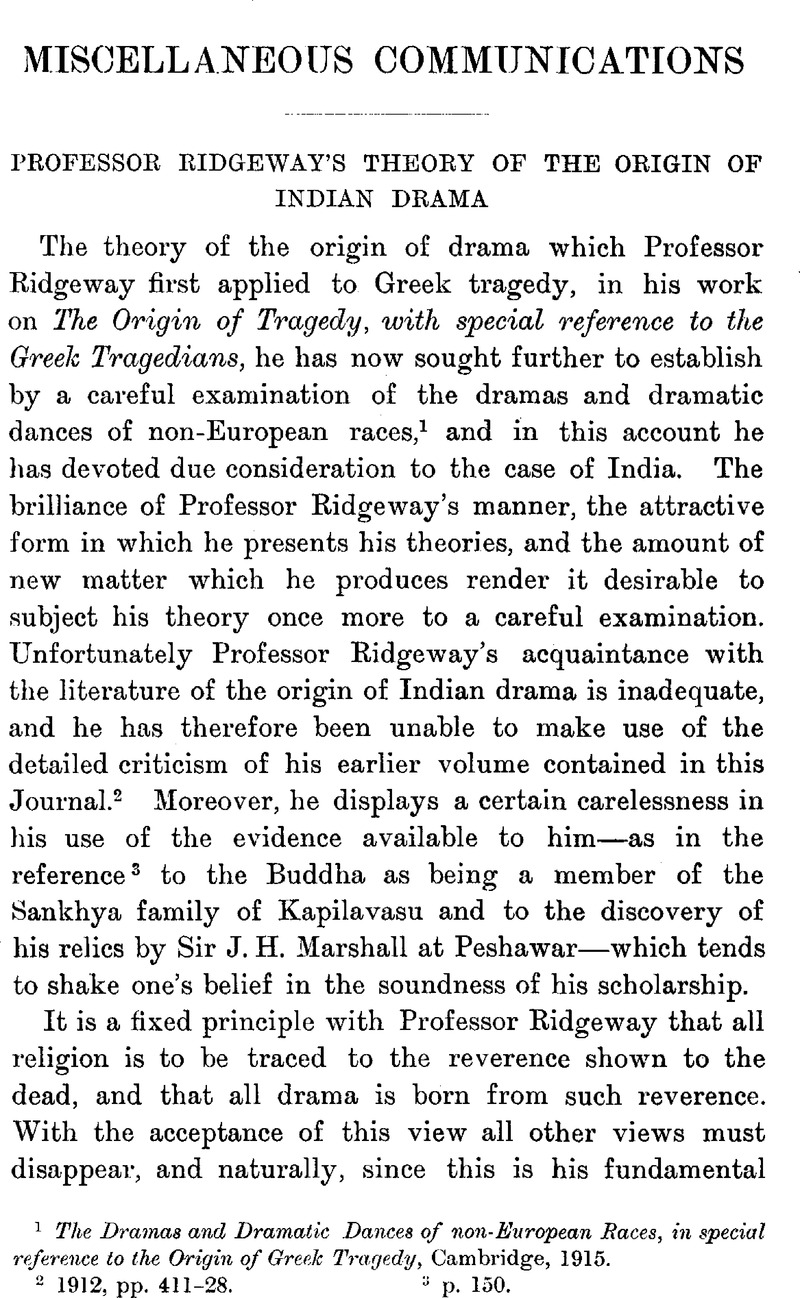No CrossRef data available.
Published online by Cambridge University Press: 15 March 2011

page 335 note 1 The Dramas and Dramatic Dances of non-European Races, in special reference to the Origin of Greek Tragedy, Cambridge, 1915.Google Scholar
page 335 note 2 1912, pp. 411–28.
page 335 note 3 p. 150.
page 336 note 1 Asiatic Researches, ser. I, pp. 27–8.Google Scholar
page 336 note 2 pp. 127–8.
page 336 note 3 Professor Ridgeway himself quotes (pp. 145–6) a passage where I distinguished the two elements of Indian religion.
page 337 note 1 Keith, , JRAS. 1912, pp. 470–4.Google Scholar
page 337 note 2 JRAS. 1915, pp. 790–9.Google Scholar
page 338 note 1 p. 136.
page 338 note 2 p. 152.
page 338 note 3 pp. 157–72.
page 339 note 1 p. 211.
page 340 note 1 JRAS. 1911, pp. 1008Google Scholar seq. The fuller version in 1912, pp. 421 seqq., is ignored.
page 341 note 1 This is a piece of carelessness, and is quite incorrect.
page 342 note 1 p. 438, in an unacknowledged quotation from Dowson, 's Hindu Mythology, p. 161.Google Scholar
page 343 note 1 JRAS. 1908, p. 172, n. 4.Google Scholar
page 343 note 2 Théâtre indien, p. 315.Google Scholar
page 343 note 3 The assertion on p. 157 that the work is not later than 25 A.D. is an error; there is no conclusive evidence to fix its date if the strong grounds for putting that at about 150 B.C. are not accepted. It may be added that the reliance on the argument from Punch and Judy is very unwise; without expressing any opinion on the origin of that show Professor Ridgeway may be reminded that Guy Fawkes is not the origin of the ceremonies observed on his day.
page 344 note 1 JRAS. 1908, pp. 169 seqqGoogle Scholar., a view now accepted by Garbe.
page 344 note 2 p. 144.
page 344 note 3 Śāṅkhayana Āmṇyaka, pp. 78 seqq.Google Scholar
page 345 note 1 On this point Professor Ridgeway agrees with me; see pp. 154, 156.
page 345 note 2 p. 145. Cf. JRAS. 1909, pp. 203, 204.Google Scholar
page 345 note 3 p. 142.
page 345 note 4 JRAS. 1908, p. 172, n. 5.Google Scholar
page 345 note 5 Archiv f. Religionswissenschaft, 1904, pp. 397 seqq.Google Scholar
page 345 note 6 I have never rested my case on the Kaṁsavadha alone. JRAS. 1908, p. 172Google Scholar; 1911, p. 1008; 1912, p. 423; ZDMG. lxiv, 534 seqq.Google Scholar
page 346 note 1 The Cults of the Greek States, v, 235.Google Scholar
page 346 note 2 pp. 73 seqq.
page 346 note 3 pp. 20, 21.
page 346 note 4 JRAS. 1912, pp. 411 seqq.Google Scholar
page 347 note 1 Cf. Themis, pp. 202 seqq.Google Scholar
page 347 note 2 That totemism is so dependent I readily agree, but I do not know what totemism means to Professor Ridgeway.
page 347 note 3 pp. 374 seqq.
page 347 note 4 See JHS. xxxv, 282.Google Scholar
page 348 note 1 pp. 65–94.
page 348 note 2 pp. 94–121.
page 348 note 3 pp. 216 seqq.
page 348 note 4 p. 12. The argument is evidently serious.
page 349 note 1 JRAS. 1912, p. 425, n.Google Scholar
page 349 note 2 The Cults of the Greek States, v, 211, 212.Google Scholar
page 349 note 3 The Origin of Attic Comedy (1914).Google Scholar
page 349 note 4 Archiv f. Religionswissenschaft, 1908, p. 167.Google Scholar
page 349 note 5 p. 404.
page 349 note 6 JRAS. loc. cit. The same error is made by Wissowa (Religion und Kultus der Römer 2, p. 560, n. 4Google Scholar) in respect of the Lupercalia and its ritual abuse, which he seeks to refer to a later period in the face of all the evidence.
page 350 note 1 pp. 414–22.
page 350 note 2 See JRAS. 1912, p. 428.Google Scholar